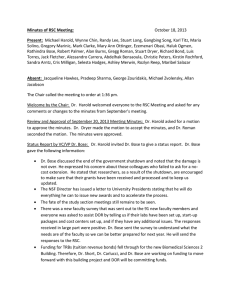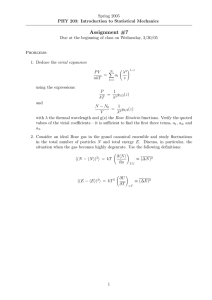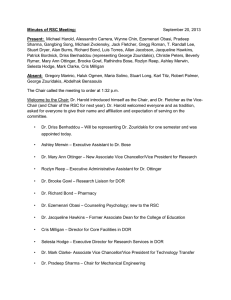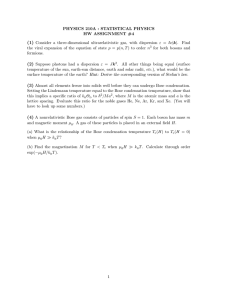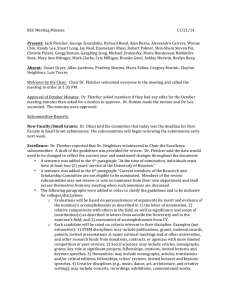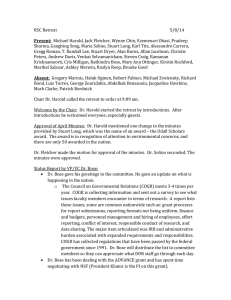Research and Scholarship Committee Meeting March 28, 2014
advertisement
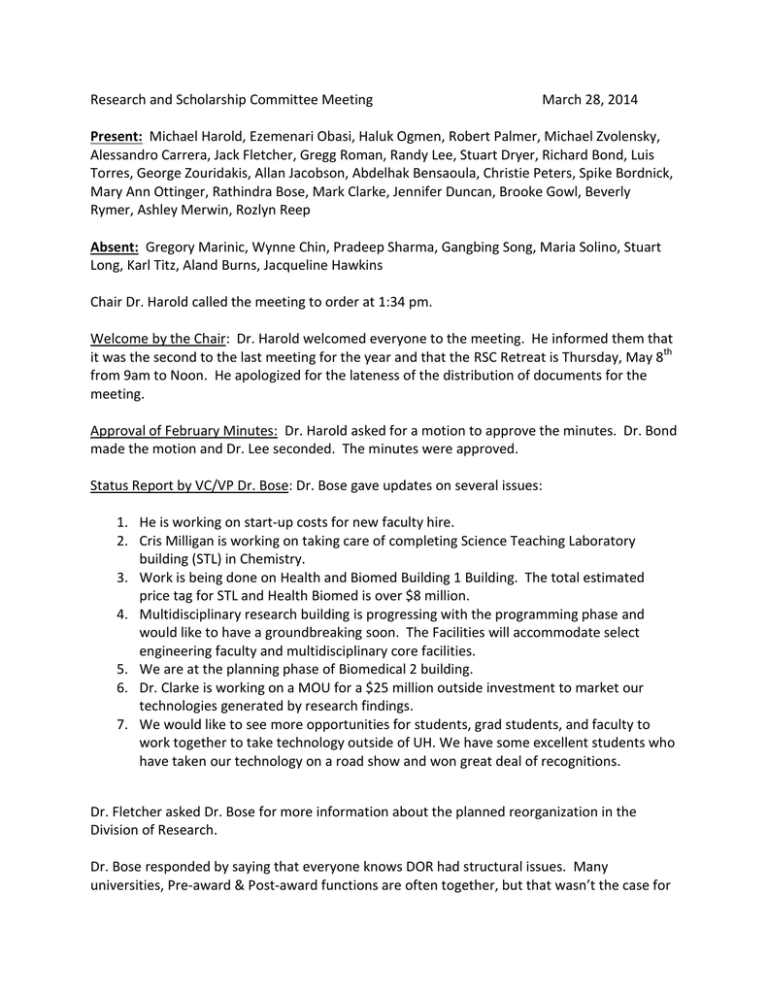
Research and Scholarship Committee Meeting March 28, 2014 Present: Michael Harold, Ezemenari Obasi, Haluk Ogmen, Robert Palmer, Michael Zvolensky, Alessandro Carrera, Jack Fletcher, Gregg Roman, Randy Lee, Stuart Dryer, Richard Bond, Luis Torres, George Zouridakis, Allan Jacobson, Abdelhak Bensaoula, Christie Peters, Spike Bordnick, Mary Ann Ottinger, Rathindra Bose, Mark Clarke, Jennifer Duncan, Brooke Gowl, Beverly Rymer, Ashley Merwin, Rozlyn Reep Absent: Gregory Marinic, Wynne Chin, Pradeep Sharma, Gangbing Song, Maria Solino, Stuart Long, Karl Titz, Aland Burns, Jacqueline Hawkins Chair Dr. Harold called the meeting to order at 1:34 pm. Welcome by the Chair: Dr. Harold welcomed everyone to the meeting. He informed them that it was the second to the last meeting for the year and that the RSC Retreat is Thursday, May 8th from 9am to Noon. He apologized for the lateness of the distribution of documents for the meeting. Approval of February Minutes: Dr. Harold asked for a motion to approve the minutes. Dr. Bond made the motion and Dr. Lee seconded. The minutes were approved. Status Report by VC/VP Dr. Bose: Dr. Bose gave updates on several issues: 1. He is working on start-up costs for new faculty hire. 2. Cris Milligan is working on taking care of completing Science Teaching Laboratory building (STL) in Chemistry. 3. Work is being done on Health and Biomed Building 1 Building. The total estimated price tag for STL and Health Biomed is over $8 million. 4. Multidisciplinary research building is progressing with the programming phase and would like to have a groundbreaking soon. The Facilities will accommodate select engineering faculty and multidisciplinary core facilities. 5. We are at the planning phase of Biomedical 2 building. 6. Dr. Clarke is working on a MOU for a $25 million outside investment to market our technologies generated by research findings. 7. We would like to see more opportunities for students, grad students, and faculty to work together to take technology outside of UH. We have some excellent students who have taken our technology on a road show and won great deal of recognitions. Dr. Fletcher asked Dr. Bose for more information about the planned reorganization in the Division of Research. Dr. Bose responded by saying that everyone knows DOR had structural issues. Many universities, Pre-award & Post-award functions are often together, but that wasn’t the case for UH. He has now consolidated Pre & Post-award functions, which will be administered by Beverly Rymer. Dr. Bose had a meeting with folks from F&A to understand the sources of invoice issues and also for the start and close of grants. He’s working with Mike Gleeson and others on implementing PeopleSoft grants module that will allow us better control of invoicing. Dr. Bose requested help from everyone in regards to communication. As a follow up to Dr. Bose’s response, Dr. Fletcher said faculty members are concerned about opportunities for faculty input. Dr. Lee agreed and stated that the RSC would like to provide more input. Dr. Bose responded by saying that DOR can ask the RSC about specific problems, and that there is a standard practice for the work flow in the division. He needs to know what the issues are, and suggested that DOR personnel visit colleges. Jennifer Duncan told the committee that she has been able to meet with several faculty members in order to receive feedback. She and Beverly work for the faculty, and they want to know how they can provide the best customer service. She would like to align folks with their skill set and see who serves their department. She is happy to talk with faculty to see what’s not working so they can go to staff and work on those issues. If staff members are not responding, she will work to resolve the problem. She would like an organizational structure that will meet everyone needs. Dr. Harold suggested that Ms. Duncan get with people from specific colleges to discuss issues and get formal feedback. Jennifer said that she has met with departmental staff to discuss what’s not working. Dr. Lee said that having an organizational chart will help. Dr. Obasi stated that organizational structure is not the same as behavioral, and that there needs to be a way to have continuous feedback. Ms. Duncan said they need to set the tone of expectations with staff, and that faculty should be able to email once and receive a response. If they don’t, she encourages them to contact her and Beverly and they will reach out to that staff member. She also stated that it would be helpful for PI’s to get their submissions in sooner. She also mentioned the need to work on collaborations with DOR and central colleges. Dr. Bose told the committee he would also like to help, and that DOR services has been decentralized. He has done more decentralizing than before he came to the University. Faculty members have the authority to submit their proposals, which can put DOR in a tough situation when faculty fail to submit transmittal forms. Dr. Harold stated that the RSC is there to help DOR. In response to Jennifer Duncan noting that input would be needed by April 10th, he asked RSC members to solicit feedback from their colleges on these issues by April 10th, and to maybe consider a formal way to provide feedback in the future. He noted that this feedback would be needed by about April 5th so that it could be provided to DOR. Subcommittee Reports: Excellence & Research: Dr. Lee thanked his subcommittee members – Dr. Bond, Dr. Chin, Dr. Palmer, Dr. Sharma, Dr. Zvolensky – for their hard work. He said they were thoughtful and responsible and looked at all of the candidates at each level. They had a very difficult time choosing. The recommended winners are as follows: Assistant Professor: Dr. Ognjen Miljanic (CHEM) and Dr. Jeffrey Rimer (CHEM ENG) Associate Professor: Dr. Steve Baldelli (CHEM) and Dr. Daniel O’Connor (HHP) Professor: Dr. Ramanan Krishnamoorti (CHEM ENG) and Dr. Venkat Selvamanickam (MECH ENG) Dr. Harold told the subcommittee members he appreciates all of their hard work. Dr. Bose asked how many nominees there were. Dr. Lee reported that there were 13 for Full Professor, 11 for Associate Professor, and 14 for Assistant Professor. Dr. Palmer suggested perhaps a lunch for all of the nominees. Dr. Lee said his subcommittee had two recommendations for next year. First, include a statement that reference letters deemed as "arm's-length" will carry more weight than those deemed as "not arm's-length". Second, include a statement that, if the candidate received a Research Excellence Award at a prior level, the nomination letter and CV should clearly indicate the achievements and contributions made since the prior award. Dr. Harold asked for a vote on the subcommittee’s award selection and recommendations. Dr. Dryer made the motion and Drs. Roman and Fletcher seconded. The recommendations and awardees were approved. Dr. Ottinger informed the committee that winners will be invited to attend the Faculty Awards Luncheon on Monday, April 28th. She also asked that colleges keep the news quiet until University Communications sends out an official news release. Dr. Lee told Dr. Harold that the RSC Chair has notified winners in the past. GEAR: Dr. Ogmen reported that his subcommittee received full proposals and issued assignments to reviewers. They will meet next Friday and will have a list of winners for the committee’s approval at the next meeting. New Faculty & Small Grants: Due to time, Dr. Torres’ subcommittee report was tabled for the next meeting. Centers & Institutes: Dr. Zouridakis reported that his subcommittee is still working on the revised annual reporting form but was able to work on the classification of additional Centers/Institutes. He provided members with a handout outlining the identification of seven centers or institutes that were not reviewed by the subcommittee last year and five more that were reviewed but should be reclassified as falling under RSC purview: Center/Institute RSC yes/no Designation Director Abramson Center for the Future of Health YES Research Cliff Dasco Allied Geophysical Laboratories Contact director Rob Stewart Biology & Biochemistry Imaging Core (BBIC) YES Research (may qualify as University Center; needs to be under DOR purview) Core /service Center for Advanced Computing and Data Systems (CACDS) YES Core /service Center for the Mathematical Biosciences (CMB) Contact director NO Research (?) Kathleen Gajewski Barbara Chapman Suncica Canic Academic John Vincent Contact director NO Research (?) Jim Granato Tanya Venegas Center for Forensic Psychology Hobby Center for Public Policy Hospitality Financial & Technology Professionals (HFTP) Research Institute Institute for Health Care Marketing YES Professional Organization, not center Research Materials Research Collaborative (MRC) NO Academic Donna Kacmar Texas Center for Clean Emissions, Engines & Fuels YES Core facility Henry Ng Texas Eye Research and Technology Center Contact director Research/Active? Jan Bergmanson Edward Blair Dr. Zouridakis continued his report by saying that his subcommittee went through proposals for NCALM (National Center of Airborne Laser Mapping) & CNRCS (Center for Nuclear Receptors and Cell Signaling): – NCALM - The revised proposal did not address the specific concerns raised previously and the committee recommended that a separate document be produced to address, point by point, all weaknesses identified previously to help the Committee formulate a final recommendation. – CNRCS - The revised version of the proposal along with the memo provided adequately addressed all concerns raised previously and the committee recommended acceptance of the proposal. Dr. Bose asked if the subcommittee had a chance to look at CNRCS’s business plan and see what they wanted from DOR. Dr. Zouridakis responded by saying their return investment is high and that they have more collaboration with the medical center. Dr. Bose said that at the last meeting members probably thought he was trying to defend CNRCS. He said there’s an expectation from the center that DOR will continue to sponsor them. He understood that they are requesting $1 million a year in support over the next 5 year period. Dr. Fletcher told Dr. Bose that all the committee can do is review the proposal and budget submitted to the committee. They can offer recommendations, but ultimately the decision is up to DOR. Dr. Harold said they do not have a way to measure investment. Dr. Ogmen suggested that at the time the investment is made, the center/institute will be held accountable and they will know how to measure. Dr. Palmer expressed concern about a center gaining status with DOR funds, and asked if this should be tabled for next year. Dr. Dryer said the cell signaling center receives all their IDC according to their original agreement with the university; however, they do not contribute to fund departmental operations in which they participate. Dr. Zouridakis said that according to his subcommittee’s point of view, CNRCS does qualify, but it’s up to Dr. Bose to decide when factoring in the financial issues. A vote on recommendations was tabled for the next meeting, and it was agreed that the subcommittee will look at budget numbers again. Some frustration was expressed by members that the approval decision would be delayed. Core Facilities: Dr. Fletcher reported that a line was added to the first paragraph of the Core Facilities proposal guidelines. Members reviewed the change in the handout that was provided. Dr. Harold asked for a motion to approve. Dr. Roman made the motion and Dr. Zouridakis seconded. The motion passed. Dr. Bose informed the committee that there are currently no funds for this program, and prospects for next year depends on the DOR budget. Conflict of Interest: The report was tabled for the next meeting. Intellectual Property: Dr. Dyer said there was nothing to report. New Business: OMB Document Presentation: Was tabled for the next meeting. Old Business: Research Faculty Roles: Dr. Harold showed a PowerPoint slide on Research Faculty: Current effort in Faculty Senate to converge on policy for non-tenure track faculty. Note: A policy was voted down during AY2013. Need to ensure RSC provides input on matters regarding research faculty. These matters include, but not limited to: o Bridge compensation during lean funding o Thesis committee chair Proposal: RSC converge on recommendation to contribute to the Faculty Senate committee Dr. Bensaoula told the committee he received documents from Drs. Harold and Fletcher that had been circulated in the Senate and other committees in regards to non-tenure track faculty. He reviewed minutes from the discussions and came up with several conclusions: 1.) no matter what policies we implement in hiring, promoting, and evaluating research faculty, we won’t make progress unless we address two issues in the documents: A. If research faculty are so good, why aren’t they in a tenured or tenure-track position? B. Improving research faculty undermines the tenure system. Dr. Bensaoula requested feedback from the committee. Dr. Lee told Dr. Bensaoula that his first point is misdirected. The concern that people have about research faculty is that there are examples of people not properly vetted. The statement from the Faculty Senate is they need a document that outlines the vetting process by which research faculty can be permitted to serve as a dissertation Chair, for example. Until the Faculty Senate has a document they can’t do anything. Dr. Bensaoula mentioned a document that had come from the research committee, but it was decided that it came from the Research Council which was before the Research and Scholarship Committee was created within the Faculty Senate. Dr. Lee said the Faculty Senate did not vote on the document because it was missing the vetting process for Research Faculty. Dr. Harold said that Research Faculty can be approved at a department level, and as a department chair, it’s clear to him that the vetting for research faculty is nowhere near the vetting for tenure-track faculty. Dr. Harold told Dr. Bensaoula that he would like to see the document that he has been referring to and would like the RSC to provide input on the document. He mentioned that perhaps an idea is to create a clear vetting process for research faculty. Before ending the meeting, Dr. Harold made one final comment. He reminded everyone that the ePerformance deadline is April 1st, and according to MAPP policy, if you do not do an ePerformance for Post Doc you will not be able to get merit, and this should be changed. Dr. Lee seconded. Dr. Clarke suggested that they ask Joan Nelson in HR. The meeting was adjourned at 3:16 PM. The next meeting will be on Friday, April 25, same location from 3:30 – 5:00 pm.
